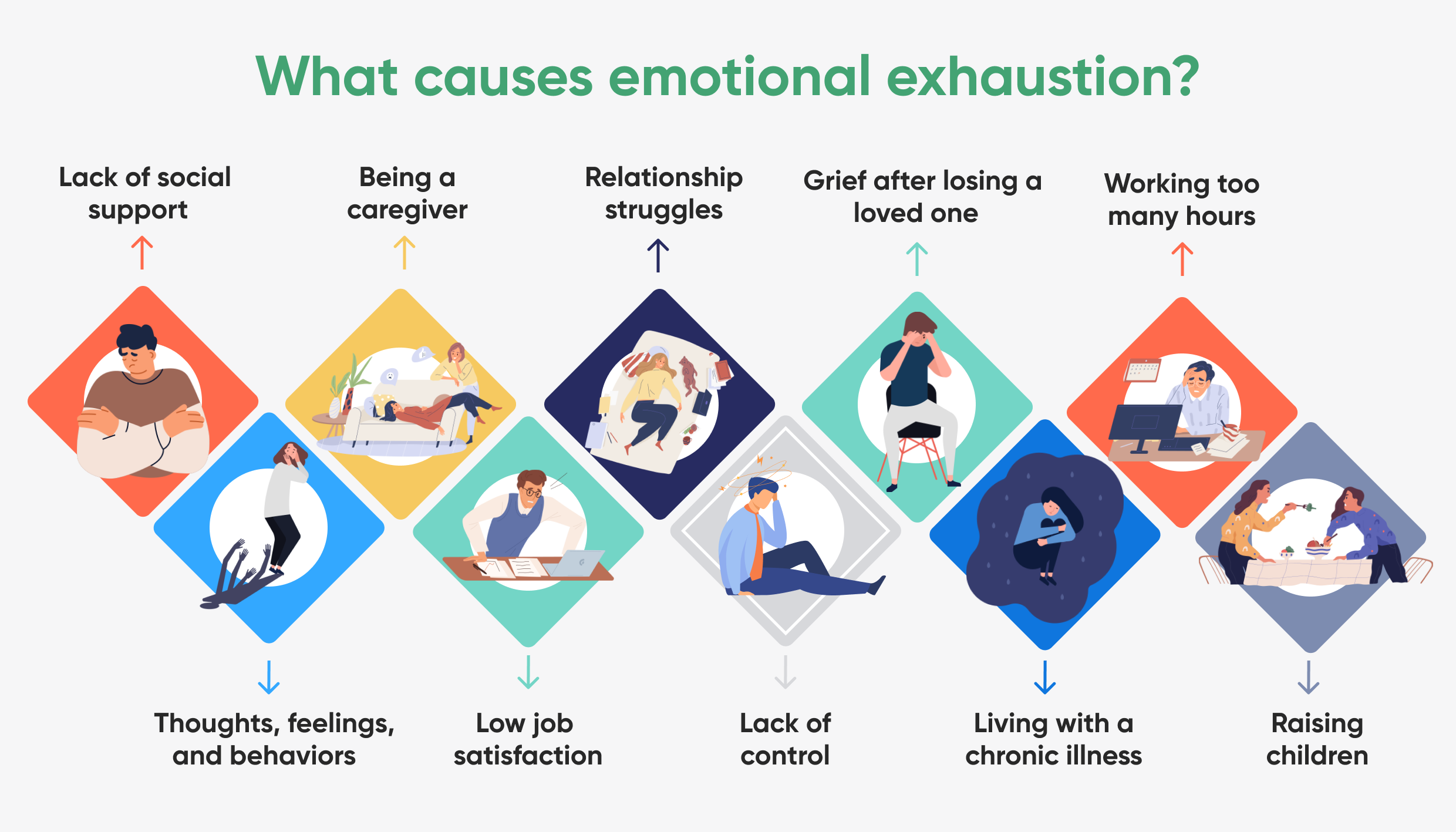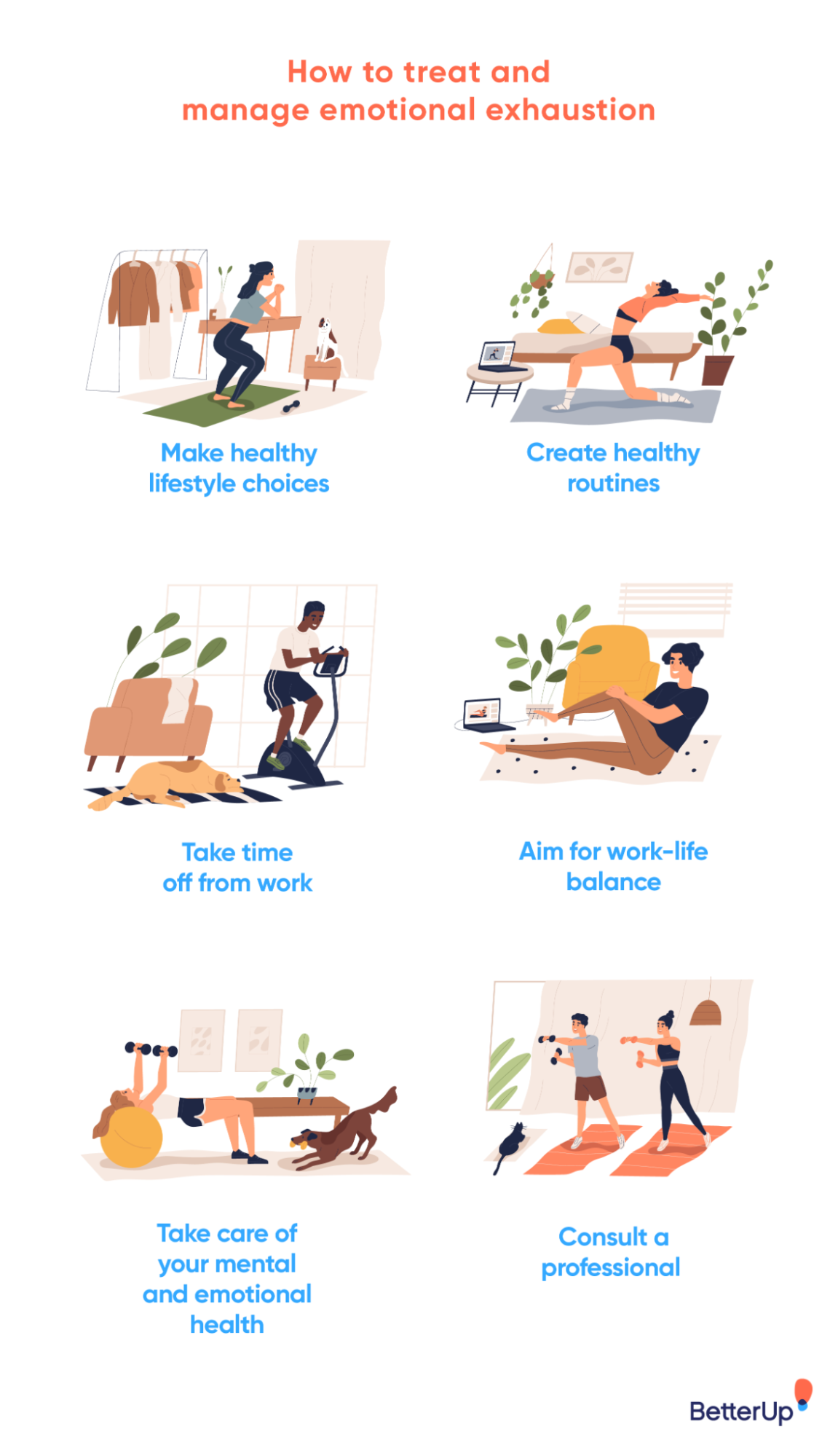Emotional exhaustion is the state of feeling emotionally drained or emotionally tired because of stress build-up. We all experience stress, but when stress is too high, we lose our sense of control and our energy. It could be work-related, school-related, relationship related or it could be related to any other aspect of your life. Burnout can be very exhausting to experience. It affects how we function and how we interact with other people.
Anyone can be at risk of experiencing emotional burnout but it is most common amongst people with demanding jobs, care-givers, people going through a major life change such as a loss of a loved one, living with a chronic illness and financial stress. The list of life challenges is endless. People who are facing major life challenges are at high risk of emotional burnout.
Effects of not dealing with emotional burnout
Before talking about dealing with emotional burnout, it is important to talk about the effect of emotional burnout on mental and physical health if we do not deal it with.
- Unhealthy release of stress hormones.
- Physical ailments.
- Challenges in social interaction.

Ways to deal with emotional burnout
When you are going through emotional burnout, you think your situation can not be changed, and you feel stuck. There are a few ways that you can deal with emotional burnout if you are struggling with it.
- Acknowledge that you are suffering from emotional burnout. The first stage of every recovery is accepting where you stand. Acknowledge that you are emotionally exhausted and that you are not OK. Most people pretend that everything is OK when it isn’t and living in this denial does not help your situation. Acknowledging emotional burnout puts you in a better position to deal with it.
- Identify why you are experiencing emotional burnout. It could be a single reason or several reasons you are suffering emotional burnout. It is important to take a few minutes to figure out why you are feeling emotional burnout.
- Establish solutions to your problem. Coming up with solutions to a problem can be a challenge and intimidating because sometimes you may feel like the problem is too big to solve. It is OK to give yourself time to come up with effective solutions to the problem and trust yourself that you can solve the problem. It is also Ok to seek counsel from loved ones or anyone you feel can give you the best advice regarding the issue.
- Take a time-out. Taking a break can help you refocus the direction in which you are going. We often hesitate to take a time out because we have responsibilities to attend to and deadlines to meet, but it is important to understand that your health comes first above everything else. You are no good for your job or your relationships if you cannot fully give yourself. It’s OK to take a few days off work to recover from emotional burnout, it’s OK to take a break from your social life and relationships to focus on yourself.
- Take better care of yourself. While you are recovering, it is vital to put necessary measures in place to allow yourself to fully recover. Listen to your body, get rest when you feel tired, eat when you feel hungry and do activities that elevate your mood such as exercise or watching a funny movie. Learn to do things at a pace that you can manage and don’t be afraid to say no if you can’t do something or attend an event.
Here are ways to treat and manage emotional exhaustion:
1. Make healthy lifestyle choices
– Create a morning routine that sets your day up for success. For example, drinking a fruit and veggie smoothie, going for a short walk, or spending a full hour doing yoga.
– Create an afternoon routine that helps you refresh before going back to work — i.e., reading a book, taking a power nap, and drinking lemon water.
– Create an evening routine that helps you settle down before bed, such as deep breathing, journaling, and taking a bath.
2. Take time off from work: While spending time at work is a vital part of living a healthy life, it’s important to spend time away from the office every once in a while as well:
– Take advantage of your vacation days and sick days if you have them. Go on a getaway retreat with your friends or loved ones, or even by yourself.
– Aim for work-life balance. As we mentioned before, working long hours can lead to depression, emotional exhaustion, and burnout. Knowing when to stop working, for instance: don’t push through exhaustion. Listen to your body when it tells you it’s done.
Sticking to your work schedule as strictly as possible.
3. Scheduling fun activities and hobbies outside of work every week.
– Having something to look forward to outside of work every day, i.e., a cup of hot tea while you watch a movie.
4. Learn how to manage stress and regulate your emotions by:
– Practicing mindfulness meditation.
– Starting a gratitude practice.
– Nurturing your emotional intelligence.
– Practicing the Emotional Freedom Technique/Tapping.
5. Consult a professional: If you’re unable to manage your emotional exhaustion, you’re experiencing anxiety or depression, or suicidal thoughts, it’s time to consult a medical professional for help.
Emotional burnout in most cases can be avoided if you always take measures to care of yourself. Do not overwork yourself, be kind to yourself and your body, be a better communicator and love yourself enough to put yourself first always.

